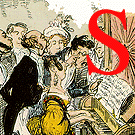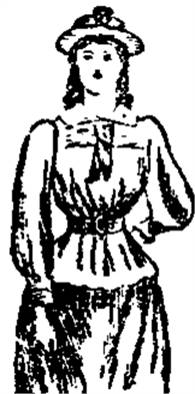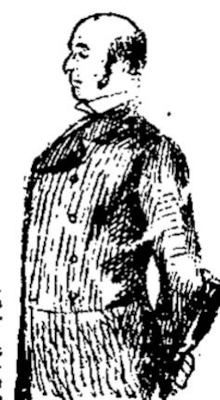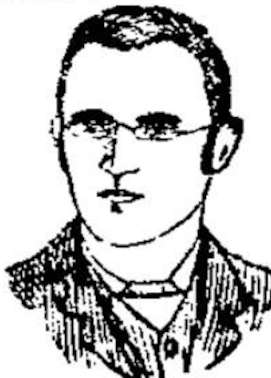This article has been transcribed from a copy of the Cardiff Times in the online collection of scanned Welsh newspapers 1804-1919 in the National Library of Wales, with grateful recognition of the free access accorded to all readers. Paragraph breaks have been introduced for easier reading. George Cruikshank created the decorated initial.
This article is one of many to express anxiety at educational advances for women and the working class. Yet, despite his social prejudices, Samuel has identified a real weakness in much late nineteenth-century education: the excessive memorising of facts. Elementary school teachers, for example, were expected to be able to recite the names of the rivers of Great Britain in order, both clockwise and anti-clockwise, around the coast. Thus far Samuel's argument is sound, but he fails to see the damaging weakness of concentrating on facts at the expense of an understanding of principles, particularly in the sciences. The weakness of scientific and technical education for all social classes meant that Great Britain had already lost its industrial pre-eminence. We saw in Samuel no. 63, 'Samuel on Evening Parties' (17th November 1888) that Germany was developing its industries faster, by promoting the study of science and engineering a all levels. In this context Samuel's belief that 'too much education spoiled the labouring classes' is an example of the damaging ignorance of the classically educated élite. His model of a 'rounded' education probably includes physical education and sport, but not technical subjects.
The 'lady [who] has just lately / Topped the senior wranglership' was Philippa Fawcett (1868-1948} who was placed first in the list of mathematics graduates in Cambridge in 1890, though, as a woman, without being awarded a degree or becoming known as 'Senior Wrangler'. This is recent news. The Senior Wrangler is the top mathematics undergraduate at Cambridge University. Although the University allowed women to take the examinations, it did not allow them to be members of the University or to receive degrees.
The South Kensington Science and Art Examination was administered by the Science and Art Department, which was a British government body that from 1853 to 1899 promoted education in art, science, technology and design in Britain and Ireland. —— David Skilton

ince the dark days when an ordinary commercial education consisted of an intimate knowledge of the 'three R's' (with a penny a week extra for manners), intellectual development in the schools of England has been on the march, and to-day it may fairly be said to have reached the top of the educational ladder.

New style pupil.
Nor has this advancement been confined to the male sex; in fact, the ladies have gone ahead to such an extent that they have actually beaten their sterner[s] rivals in the race for educational honours.
The plums of education
Are no more for men a 'snip,'
For a lady has just lately
Topped the senior wranglership.

Old style pupil.
Oh, these ladies! They are not content to reign as the heads of the domestic affairs of the nation, but they must needs compete with the men in all the branches of science and art once held sacred to the sterner sex. Medicine has admitted them into its ranks, the Government offices are graced by their presence – and, as I once heard a man put it, in 'foreign countries abroad' they have been allowed to compete with the members of the legal profession, and appear in court. They ought to succeed in a profession where the last word is of vital importance. Under the fostering care of Governments and individuals the education of the masses has gradually been removed from the elementary state our forefathers knew until it has arrived at a state of perfection which they and their pastors and masters would have considered positively wicked. They [did] not believe in educational equality in those days, and held — and rightly so — that too much education spoiled the labouring classes. Now-a-days the children of the working-classes are able to get a varied education for a few coppers weekly. Yet, in spite of all this, I contend that the present system of educating the masses — artisans and middle classes – Is doing more harm than good, for the whole end and aim of elementary schools is '98 per cent.' This percentage of passes is the goal which teachers and scholars alike strive to reach, and so much is it vital to the teacher that unless he reaches it he is most likely to be reminded of its importance in a manner more practical than pleasant. It is the Alpha and Omega of the teacher's life, and not unfrequently the death blow to the scholar's ambition. On the attainment of 98 per cent. of passes depends the welfare of schools and the amount of the Government grant, by the aid of which schools are kept open at fees which do not pay for teachers alone. The result of this is that the scholars are subjected to a process of educational slave driving, and are crammed to the fullest possible extent with matter frequently of no practical use to them, but which is likely to be of use to the school directorate at the examinations of the Science Department, for should the pupils pass more grist is brought to the educational mill in the way of Government grant.

Old style master.
Elementary schools subject to Government inspection are doubly liable to the effects of the overpressure, for not only do they aim at the highest possible percentage of passes under the inspector, but they also send in picked pupils for the South Kensington Science and Art Examination. Only those who have experience of educational work in elementary schools have any notion of the effects of '98 percent. education' on the minds and bodies of teachers and scholars. Instead of being developed on the broad principles of a sound and rational education, they are dwarfed and warped by the perpetual tension of 98 per cent.
I remember being present at an examination in a science subject likely to produce much kudos, and where some 50 to 60 pupil teachers from various elementary schools were sitting. The general appearance of the candidates was depressing to a degree. The freshness of youth had apparently departed, and in its place was the careworn appearance begotten of overpressure. They were all suffering from an attack of 98 per cent. So it is, too, with the scholars, who have so much work to cram in after they leave the school premises that they are almost entirely deprived of the ordinary recreative outlets for their crowded minds and tired bodies. The result is that, instead of taking an interest in their work, they begin to hate it, and become in process of time mere machines to be perpetually fed and driven at the rate of 98 per cent. The whole system is rotten, and its development has led to the abuse of an Act intended, as its title conveyed, to be in reality an Elementary Education Act. The so-called elementary education of today is neither more nor Jess than an advanced system of educational fattening for the production of victims at the altar of 98 per cent.

Modern master.
In middle-class schools things are little better, for in the place of inspection percentage come the Government examinations, on the result of which the schools depend for their Government aid.
If the general efficiency of the schools were faithfully tested and grant paid for all-round excellence, the scholars would be far healthier and brighter than they are, and the masters would be able to pay attention to their general culture and welfare – a thing totally impossible under the present conditions. Until this thing is done things will be no better, and the vaunted age of education will go on producing crammed scholars and cramming teachers, and the papers will still contain accounts at intervals of scholars dying from brain fever caused by overpressure in the sacred cause of 98 per cent.
Links to Related Material on Education in Victorian England
- Education in Victorian England
- William Edward Forster, MP, and Universal Elementary Education
- Who Shall Educate? or, Our Babes in the Wood. (Punch)
Last modified 10 April 2022